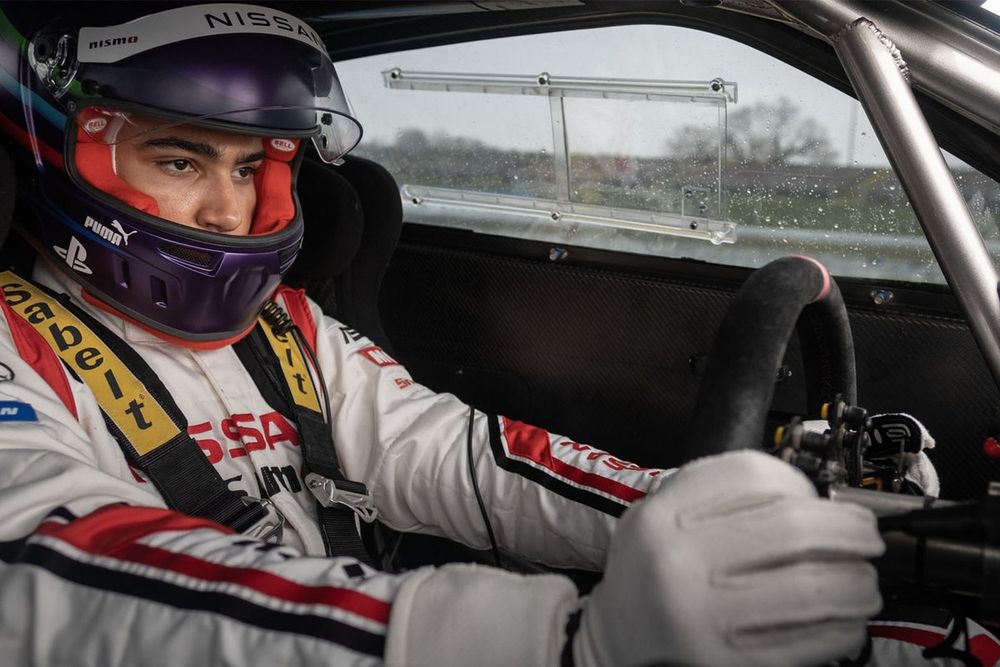
The relentless push for the Japanese tech giant to turn its PlayStation franchises into TV programmes and films continues unabated. Hot on the heels of HBO’s The Last of Us rendition and the Uncharted adaptation follows not God of War or Horizon, but perhaps surprisingly the Gran Turismo film.
Directed by Neill Blomkamp (District 9), this is not the story of laser scanning tracks or recording the V10 gargle of a Lamborghini Huracan – although a Netflix-style documentary wouldn’t go amiss. Instead, the set up is to show that video game players are talented enough to become motorsport competitors. This exposition is based on the true story of aspiring racing driver Jann Mardenborough, played here by Archie Madekwe (Midsommar) who, in 2011, won the GT Academy competition that took Gran Turismo drivers from their consoles to the real-world Nissan team.
“These are the fastest sim racers in the world,” intones Orlando Bloom’s (Pirates of the Caribbean) cocksure Danny Moore character, who is credited with the creation of the programme. Once the manufacturer is onboard with the idea, he’s trying to convince grizzled former racing driver and current mechanic Jack Salter, played by David Harbour (Stranger Things), to join in.

“You really think you’re gonna take a kid who plays video games in their bedroom and strap them to a 200mph rocket – it’ll tear them to pieces,” warns Salter. However, fed up with overseeing talentless millionaires, such as Nicholas Capa of the eponymous Capa Racing outfit, he signs on. His task is to train the wannabe Tom Kristensen’s of the world and help pick out a winner, before guiding them through the unscrupulous motorsport industry.
Mardenborough is the main focus of your attention, the plucky teenager incongruously listening to the dulcet tones of saxophonist Kenny G and Enya pre-race, one of only a handful of humorous moments. The moments of character development, be that concerned parents or love interests, are often interrupted by someone striving to explain the importance of cars driving on track or close-ups of paddle shifters or camshafts.
Challenging topics are discussed with irreverence, and in the latter third, the justification for going racing again following a harrowing incident is weaker than a rusted exhaust. “This is not a game, this is reality,” chimes in Slater. Yes, well aware, thank you.

Still, the sense of speed and video game-aping camera angles are captivating. Mauro Calo, of Top Gear fame, was involved in the stunt driving, and you can tell. Cars slew sideways in a dramatic style. A pack of Nissan GT-Rs are separated by a gnat’s whisker at 150mph – you almost feel the disturbed air. Madekwe successfully conveys someone with determination, initially a little out of his depth in a relatable fashion. It’s not quite the visceral acting seen in Top Gun Maverick‘s fighter jet scenes, but rarely did it feel like the lead character wasn’t actually driving.
There’s a sprinkling of clever nods to the gaming franchise throughout, be that characters watching Gran Turismo content creators such as Super GT on YouTube or on-screen displays and menu noises straight from Polyphony Digital. The way it uses a CGI creation of a car around the sim rigs is a clever metaphor for how seriously some virtual drivers take their esports, and somewhat surprisingly for Hollywood, the correct terminology is used throughout without looking down on the genre.
But then we cut back to the story, and while Harbour is really trying, the script he’s working with is repetitive. “I’ve done this [track] a thousand times,” argues Mardenborough. “But not in reality,” fires back Harbour’s Salter. Okay, we get it already.

‘Bro’ and ‘dude’ are banded around without conviction, and the battle against antagonist Capa doesn’t hit hard, as the on-track rival only has one tiny scene to make them dislikeable.
Recent successful motorsport movies, Rush and Ford v Ferrari (Le Mans ’66), hinge on a clash of personalities. But this film doesn't develop on-track rivals deep enough outside of the circuit and robs it of final furlong impact. Also like the Niki Lauda and James Hunt biopic, which used Brand Hatch extensively and sometimes in reverse, true motorsport fans will notice the over-use of the Hungaroring here – although, perhaps most viewers won’t.
It doesn’t delve deep into the relationship between parent and child as they strive to pursue dreams, nor explore the pressures of expectation on young minds. The only message gained from a Nurburgring crash scene was that motorsport is dangerous, which is hardly ground-breaking.

“This entire thing is a marketing extravaganza,” proclaims Moore. Sometimes it’s hard to tell if he means the GT Academy programme or the film itself.
A likeable central character and visceral racing scenes are mixed with over-simplification and an unessential supporting cast. But, it shines a light on the possibilities of sim racing, which in turn hopefully inspires a new generation of potential racing hopefuls.
Gran Turismo is released to theatres 9 August 2023 in the United Kingdom, between 10-11 August across Europe, Canada and Australia and 25 August in the United States.








